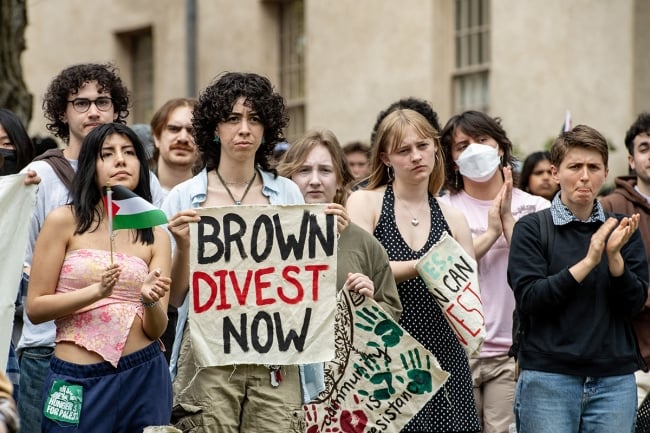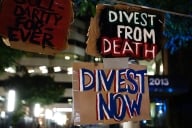You have /5 articles left.
Sign up for a free account or log in.

Pro-Palestinian student protesters and activists rally at an encampment on the campus of Brown University in Providence, R.I., on April 29, 2024.
Joseph Prezioso/AFP/Getty Images
Brown University trustee Joseph Edelman stepped down abruptly on Sunday, expressing objections to a looming October vote in which the board will decide whether to divest endowment funds from 10 companies profiting off the ongoing war between Israel and Hamas.
The pro-Palestinian student protesters driving the divestment campaign at Brown and elsewhere argue that universities contribute to what they are calling genocide by investing in weapons manufacturers and companies with close ties to the Israeli government. Divestment emerged as a key demand this spring among college students who established encampments to protest the rising death toll in Gaza.
As the protests stretched on toward graduation, multiple universities sought agreements with students, offering concessions—including the possibility of divestment—in exchange for an end to the demonstrations and encampments. Brown’s administrators were among the few who promised students they would hold a vote on divestment this fall.
An Abrupt Resignation
Edelman was one of 42 trustees who comprise the sprawling Brown Corporation, which oversees the university. A billionaire hedge fund manager, he has donated to Brown as well as conservative causes and institutions, including the Cato Institute and the University of Austin.
In an op-ed in The Wall Street Journal, Edelman explained his rationale for resigning, blasting the university for allowing the vote to go forward—a decision he called “morally reprehensible.”
(Edelman did not respond to a request for comment from Inside Higher Ed.)
“I am concerned about what Brown’s willingness to hold such a vote suggests about the university’s attitude toward rising antisemitism on campus and a growing political movement that seeks the destruction of the state of Israel,” he wrote in the Journal on Sunday.
Edelman also pointed to the mass casualties of Hamas’s Oct. 7 attack on Israel, calling the act of terrorism “the deadliest assault on the Jewish people since the Holocaust.” The violence prompted Israeli forces to launch a retaliatory campaign that has killed tens of thousands of Palestinians in Gaza, igniting student protests across the U.S. Edelman, who argued in the op-ed that Israel has “a moral duty to defend its citizens from terrorist attacks,” cast Brown’s forthcoming divestment vote as a referendum on whether Israel—and Jews—have the right to exist.
“I consider the willingness to hold this vote a stunning failure of moral leadership at Brown University,” he wrote. “I am unwilling to lend my name or give my time to a body that lacks basic moral judgment. I hereby resign from the board of trustees.”
Brown argued in response that it is following long-established procedures for managing its investments.
“While we value the service of our former trustee, he has a fundamental misunderstanding of the decisions that led to the upcoming vote on divestment,” Brown spokesperson Brian Clark wrote in an email to Inside Higher Ed. “Far from a direct response to current activism, Brown is following an established process that is nearly a half-century old. This long-held process is built on the principle that Brown has an obligation to examine and investigate claims challenging its moral responsibility.”
He went on to note that any member of the Brown community can submit a divestment proposal for evaluation. “As an educational institution, Brown is and must be a campus that confronts and interrogates difficult questions,” he wrote.
The Divestment Question
Among the many institutions that faced divestment demands from student protesters in the spring, Brown was one of few that agreed to consider acting on those demands. Administrators scheduled time for students to present their divestment plan to the Advisory Committee on University Resources Management, which advises the university on responsible investment practices—including whether investments and expenditures are consistent with Brown’s ethical and moral standards.
Brown also agreed to hold a vote on the divestment decision in October.
Late last month, 24 attorneys general representing Republican-controlled states sent Brown a letter warning that divesting could lead to financial consequences. They wrote that divestment could cause their states to “terminate any existing relationships with Brown and those associated with it, divest from any university debt held by state pension plans and other investment vehicles, and otherwise refrain from engaging with Brown.”
If Brown’s board agrees to divest, it will be in rare company. Despite the prevalence of such demands, calls for divestment from Israel or those profiting off the war have mostly failed. Of the institutions that agreed to put the matter before their board, most have rejected it so far, while some votes are scheduled for later this fall. Though the move still needs to be finalized, San Francisco State University appears close to agreeing to divest; two board committees have approved plans to cut ties with four specific companies: weapons manufacturers Leonardo and Lockheed Martin, the software company Palantir, and the heavy equipment company Caterpillar, which students have accused of supporting “Israel’s genocidal attacks on Gaza.”
Student demands at SFSU and Brown share a similar characteristic: specificity. Many protesters this spring demanded broad divestment, calling for institutions to cut ties from any company that did business with Israel, including Coca-Cola, Google, Amazon and other giant multinational corporations. In those cases, experts noted, divestment would mark a retreat from the global economy; by comparison, the divestment demands at Brown are relatively narrow.
Brown students have singled out 10 companies for divestment: Northrop Grumman, RTX Corporation (formerly Raytheon), Airbus, Volvo Group, Boeing, General Dynamics, General Electric, Motorola Solutions, Textron Corporation and Safariland. Students believe that all 10 have contributed to Israeli war and surveillance efforts, or the ongoing encroachment of Israeli settlements into Palestinian territory, which international observers have condemned.
Anila Lopez Marks, one of several students from Brown Divest Now who presented the case for divestment to the Advisory Committee on University Resources Management last week, argued that those 10 companies “facilitate day-to-day harm in Palestine amidst ongoing genocide, apartheid and scholasticide,” she said according to a recording of the meeting published on social media.
Such investments, she said, run contrary to the mission and values of Brown and against the principles established by the advisory committee.
Divestment Skepticism
Divestment remains a hard sell for university leaders and boards.
In an on-the-record media dinner Thursday featuring 11 university presidents, several responded to reporters’ questions by noting the steep challenge of divesting from companies tied to Israel’s war effort.
John Bravman, president of Bucknell University and host of the dinner, noted that broad divestment demands are essentially a request to “withdraw from the global economy.” He emphasized that boards, not presidents, drive endowment investment policies.
Carmen Twillie Ambar of Oberlin College, which recently rejected a divestment proposal, argued that diverting investments from war-related companies is akin to taking the “cheese out of baked lasagna.” She added that Oberlin’s board rejected the divestment proposal “in part because of the challenges” it posed. But she also noted the importance of fostering engagement among students. “Can you really have an impact on what’s happening by disengaging?” she asked.
Presidents whose institutions have divested from fossil fuels argued that the lines of demarcation are clearer for those companies than among those involved in the Israeli war effort.
“A lot of those funds in the fossil fuels framework were specifically designated as energy funds. It was clearer in the fossil fuel framework than in the sort of conversation that most students were having [around current divestment calls], in which they would list, like 300 companies,” Ambar said.
Pomona College president G. Gabrielle Starr concisely added, “There is no cluster bombs fund.”
Ambar also pointed out that “there was much more agreement on our campuses about fossil fuels” than in the current climate, which remains divisive. Moving ahead on divestment could silence conversations on campus and prevent “the broadness and richness of the debate,” she argued, by permitting the college to strike what is essentially a “political stance” by yielding to current divestment demands.
The Oberlin president said the question she’s grappling with is “How can we help [students] have an impact but help them understand that that particular strategy is not the way to have an impact?”








